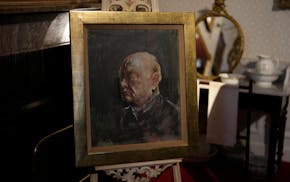The three characters in "The Children" are young enough to still have lots to do and old enough to worry about whether they'll have the time to do it.
It's a frequently funny play about death, featuring people in their mid-60s who helped create a nuclear power plant many years earlier and are living in the aftermath of an explosion at it. Hazel and Robin's home was in the disaster zone, but they've moved to a cottage just outside it. That's where they are visited by Rose, who has dropped in unannounced. Early in the play, Hazel asks Rose why she has come, getting no answer, but when Robin asks again, late in the play, "The Children" reveals its central conflict.
That device in Lucy Kirkwood's play feels slightly creaky. We're aware that information is being doled out as the playwright needs it to be, rather than as it might come out in conversation, and Kirkwood raises some interesting ideas, including a comment from Rose about the morality of having four children, that Kirkwood immediately drops. But the play is beautifully constructed, its roles are corkers and Jungle Theater's cast is ideal.
First to make an impression is Linda Kelsey as Hazel, who's sort of a crabby earth mother. The curtain has come up on Rose, bleeding on stage, and it's quickly revealed that Hazel hit her. It was an accident, supposedly, but it dovetails nicely with what we immediately see is Rose's suspicion of Hazel. Long before the play explains it, Kelsey shows us that the barely polite Hazel doesn't like Rose and has good reason not to. A mother and a woman who probably faced long odds in building a career as a scientist, Hazel is adept at doing many things at once, which Kelsey hilariously demonstrates when she hollers at Rose while also serving her a hostile salad.
Laila Robins gives Rose a quiet, sly energy that prepares us for the play's secrets; we know where we stand with Hazel, but not with Rose, who clearly has an agenda. Robins' elegant movements feel at odds with Chelsea M. Warren's cluttered, homespun cabin, and they're meant to. Robin, meanwhile, is the glue between the characters, and Stephen Yoakam shows how his character might connect to both intelligent, very different, women.
It is dazzling to watch these performers strike sparks off one another. Even the way they listen — maybe especially the way they listen — is fascinating because director Casey Stangl has staged the play so precisely. Often two of the three will have a conversation on one end of the stage, but Stangl finds ways to focus our attention on the other end of it, on the third character reacting to what's being said.
Kirkwood has given the three distinctive senses of humor: Robin's is blustery and sarcastic, Rose's dry and Hazel's bluntly judgey (informed that Rose is a breast cancer survivor, Hazel says of Rose's chest, "You used to say, 'But the backache is terrible.' I wanted to smash your face into the table."). Their differing views of death are revealed as they speak of the disaster: How are one's views altered by having children? How might previous brushes with death affect those views? Or having plans not yet fulfilled? These questions emerge as the three debate how to respond to the disaster.
It's that disaster that gives Kirkwood her title. Not to sound like Whitney Houston, but children are the future. "The Children" also could refer to Hazel and Robin's adult offspring (the first line of the play is "How are the children?"). The title also alludes to the 30-something workers at the nuclear plant, who are trying to contain the disaster and whom Rose refers to as "children." Or "The Children" could refer to all of us, on the brink of unimaginable disasters with no idea what they are or how to deal with them.
chris.hewitt@startribune.com • 612-673-4367 Twitter: @HewittStrib
What Winnie the Pooh and Mickey Mouse can tell us about the public domain and remix culture
Artist and curators refuse to open Israel pavilion at Venice Biennale until cease-fire, hostage deal
Salman Rushdie's 'Knife' is unflinching about his brutal stabbing and uncanny in its vital spirit
ABBA, Blondie, and the Notorious B.I.G. enter the National Recording Registry

